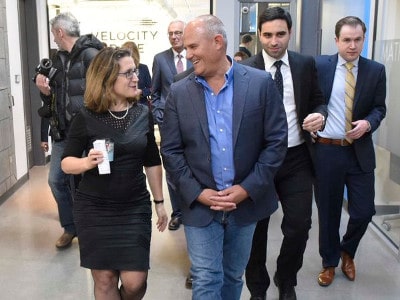Federal government unveils CanExport program for SMEs at Communitech Hub


Federal minister of international trade Chrystia Freedland and minister of small business and tourism Bardish Chagger were at the Communitech Hub in Kitchener’s Tannery Building today to unveil a new $50 million program called CanExport, designed to help small and medium-sized enterprises tap in to global markets.
“Something I want to say to all the small businesses here, I am your Chief Marketing Officer,” said Freeland. “My job is to help every company in Canada export its services and its goods.”
A recent CIBC report called Adjusting to the Value-Added Economy explicitly highlights the increasing importance of “service exports” over merchandise, stating that “Firms focused increasingly on creating solutions as opposed to just building products will take centre stage.”
Kitchener-Waterloo MP Bardish Chagger said that nearly 90% of Canada’s total private workforce is employed by SMEs, and that trade accounts for 65% of Canada’s GDP, with one in five jobs linked to exports.
By choosing to make the announcement at Communitech Hub, Freedland is underlining her government’s commitment to Canada’s tech industry, as it publicly declares a transition from over-reliance on the resource sector to Canada’s innovation economy.
Even so, exporters from any industry are allowed to apply for the grant, including manufacturing and agriculture.
“I want you to call up your local trade commissioners,” said Freedland at Communitech. “Whether they’re the ones who are in Canada or the ones around the world, get them to help you out. They will make that money go even further.”
Since coming to power in September’s election, Freedland and Chagger, along with minister of science, innovation and economic development Navdeep Bains, met with ex-BlackBerry co-CEO Jim Balsillie and several other tech leaders to discuss strategy for Canada’s tech sector.
Balsillie has been in the news recently because of his efforts to create a lobby group for Canada’s tech industry, which many see as an essential component to Canadian’s future global competitiveness, while Startup Grind Toronto’s Michael Cayley describes the lobby group as the creation of an artificial gatekeeper, and calls OMERS Ventures CEO John Ruffolo “out of touch” for supporting it.
The CanExport program will be delivered by the Trade Commissioner Service in partnership with the National Research Council Industrial Research Assistance Program (NRC-IRAP).
“CanExport is an investment in growing our economy, strengthening the middle class and helping those working hard to join it,” said Freedland. “I’m thrilled to begin 2016 with this new program that is a key part of our strategy to help Canadian companies succeed abroad. This program will enable small businesses in Canada to explore new opportunities, giving them an advantage in competitive and potentially lucrative new markets, while creating good-quality jobs at home.”
The program will provide $10,000 to $100,000 matching contributions to qualifying SMEs over the next five years.
Companies with fewer than 250 employees and annual revenue between $200,000 to $50 million are eligible for the program.
Established exporters are also eligible on condition that they are exporting new products, or if they are developing new export markets.
Companies can apply for more than one grant and, according to Freedland, can expect a response from CanExport within 25 days of application.
Freedland is the author of Plutocrats: The Rise of the New Global Super Rich and the Fall of Everyone Else, which is timely seeing as CEO salaries and the general trend towards inequality has been in the news cycle recently, with special attention paid to BlackBerry CEO John Chen’s almost $90 million haul last year.

Terry Dawes
Writer
